Download the browser for a small 1 gig of RAM. Choosing a browser that won’t slow down on a weak PC
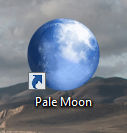 Hello everyone It seemed to me that I was well versed in hardware and software. Well, maybe it’s not that great, but it’s enough to advise you on how to solve this or that problem related to software or hardware. Well, that's it. But if six months ago someone asked me what the fastest browser in the world is, I would have answered Mozilla. And I would be right, because if you don’t delve into the topic of browsers, then it seems like Mozilla is the one that loads a website page the fastest.
Hello everyone It seemed to me that I was well versed in hardware and software. Well, maybe it’s not that great, but it’s enough to advise you on how to solve this or that problem related to software or hardware. Well, that's it. But if six months ago someone asked me what the fastest browser in the world is, I would have answered Mozilla. And I would be right, because if you don’t delve into the topic of browsers, then it seems like Mozilla is the one that loads a website page the fastest.
But I was wrong... And it all happened when I bought a board with a soldered Atom 330 processor on the cheap - small and remote. It has two cores, but there is Hyper-threading technology, that is, there are threads, resulting in 4 threads, and in Windows this is shown as 4 cores. Well, I thought, this is great, but I was a little upset when I realized that the performance was certainly not enough. Well, what should you expect from a mobile processor?
Well, that's it. I started thinking about how I could make the pages load faster in the browser. And then I installed Mozilla, but alas, it was too heavy for the Atom processor. Well then I installed Chrome. And fortunately there was enough memory (4 gigs), then Chrome worked somehow. I loaded even heavy sites, even if I had to wait a little. But I thought again, is it possible to find some kind of browser that will be like a rocket. And you won't believe it, I found it, it's called Pale Moon!
Pale Moon is a browser developed on the basis of Mozilla, which is somehow very cleverly optimized for both conventional processors and Atoms. I installed it and I was shocked - many pages actually loaded much faster, the interface is nice, it doesn’t load anything and it eats up a little RAM.
There is a version for both 32-bit Windows and 64. Both XP and Windows 10 are supported. You can download from the official website, or write in the Pale Moon search engine and the official website should be in the first position:

There you download the version for your Windows. It installs without any glitches, during installation it is not suggested to install either Yandex-soft or Mail-soft, this is already good
When you first launch it, you will be prompted to import settings from some other browser:

The last point here is to give up imports.
Also during installation you will be asked to leave the Pale Moon home page or import it from Internet Explorer:

Well, that’s all, then the browser will install and you can try what kind of Pale Moon browser it is. It seems to be translated as Pale Moon.. But I could be wrong
So, after launching the browser, you will have an unpleasant jamb. Well, maybe it doesn’t matter to some, but there is no Russian language in the browser. But don’t worry, I’ll show you how to implement it there!
This is what Pale Moon looks like:
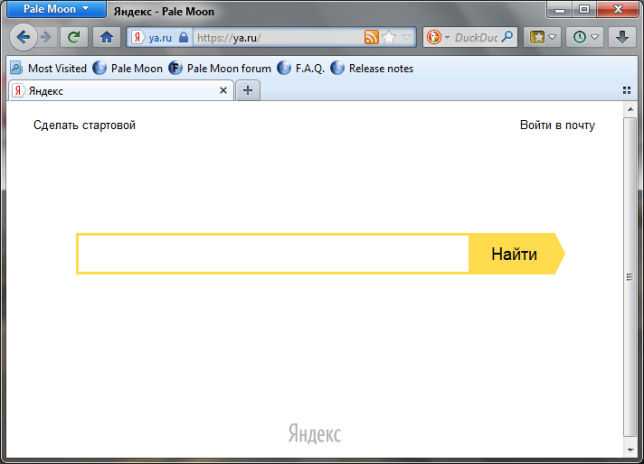
As you can see, in a word, it looks good and comfortable
Let me tell you right away that all these unnecessary buttons, the search bar (well, the one on the side of the address bar), all these bookmarks - all this can be removed and you can customize the browser for yourself.
Now about the Russian language. Let's go to this site:
palemoon.org/langpacks.shtml
Then down there we look for something like ru.xpi - this is the Russian language for the browser, look, here it is:

Click on ru.xpi and there will be a window like this, then click Install Now:

Then you should see the following message, saying that the language is installed normally and there are no jambs:

Almost everything, now all that remains is to activate the Russian language. See how to do it, first go to this address:
In the next message, click the I promise to be careful button:

Now look what you are doing, paste this:
general.useragent.locale
In the Search field and press enter:

There you should see the line general.useragent.locale, this line is a parameter that specifies the browser language. Here it now says en-US, but we need to change it to Russian! To do this, double-click on this line, the following window will appear:

And here you change en-US to ru-RU so that it becomes like this:

Click OK in this window and that’s it, now you can press F5 for the test, if it says that there are dragons here, then you did everything correctly:

Now, for the browser to be completely in Russian, you need to close it and start it, that is, restart it
Well, that’s it, so I opened the menu and everything is in Russian:
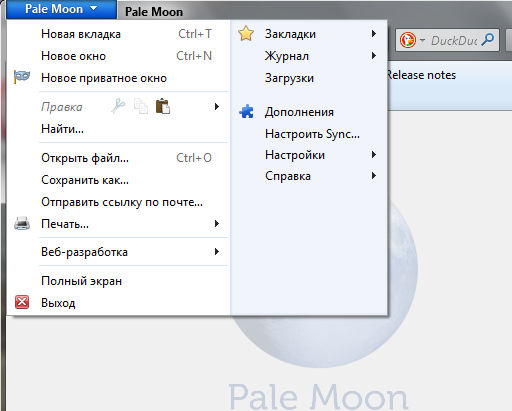
So there is nothing complicated here. Well, without leaving the checkout, I will also show you how to install a Russian spelling dictionary in Pale Moon!
To be honest, I either don’t remember or there is simply no setting where you can add a dictionary. Therefore, I propose to do this: open any page where there is a text field, for example, I opened the Yandex search engine. And right-click on the text field and check the Spell Check box:

After that, right-click again and there will already be a Languages menu, and inside it the Add dictionaries item:

Then a tab will open, by the way Mozilla, and there you need to find Russian and click on Install dictionary. I immediately advise you to hold down Ctrl + F and enter Russian into the search, so you will find it faster:
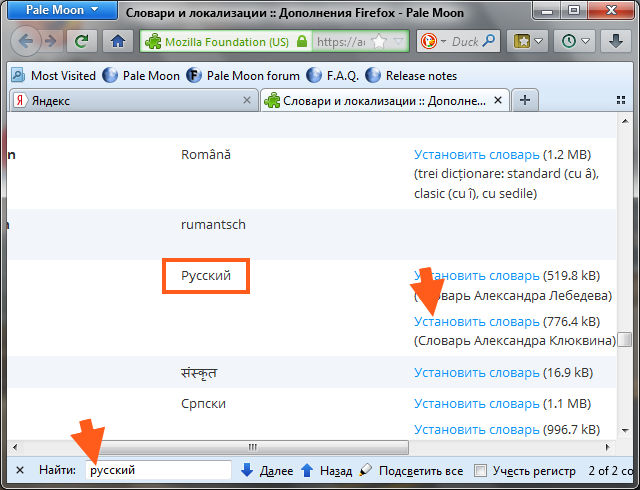
I advise you to install the larger dictionary. Well, there are probably more words, which means a better check, well, in general, I chose the one with more...
Then you will need to click on Add to Firefox:

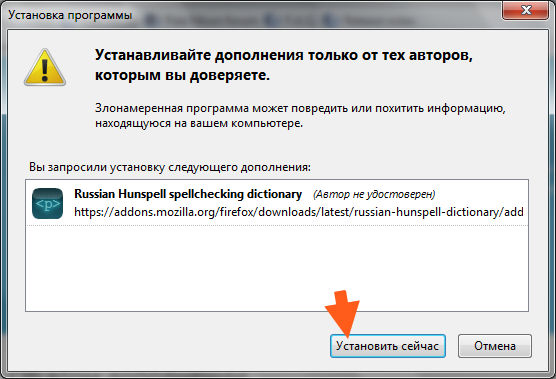
And then there will be a message saying there are no jambs, everything is installed fine:

After this, you will need to check the Spell Check box again, and then Russian will be selected automatically:

Well, you see how it all turned out. I wanted to tell you about Pale Moon, but in the end I told you how to put the Russian language into it and how to add a Russian dictionary for spell checking. Well, how could it be otherwise, this is the first thing you need to do to make the browser more or less comfortable to use.
By the way, here is the settings window (you can get to it by clicking on the Pale Moon menu button in the upper left corner and selecting the item there):

That is, you see it as if it were Mozilla, but not quite modern. That's right. Pale Moon is not made on the latest version, but, so to speak, on the one that is still modern. In general, it supports everything, YouTube and all sites, flash and video, in general, everything works there. It’s just that the version of Mozilla, as a base, is not the most recent, but simply fresh.
I don’t know whether you will like this browser or not, but in general I don’t see any strong reasons why you might NOT like it. Here are the advantages I see in it:

Well, it looks like I wrote everything I had to! I strongly advise you to try this browser and understand that I’m not making it up, it’s really very fast and even somewhat reminiscent of Opera 12. And this, well, I’ve never seen such a browser, for me, this is the best that can be from browsers Today.
With the development of web technologies, the content displayed using a browser becomes more and more “heavy”. The video bitrate is increasing, caching and storing data requires more and more space, and scripts running on user machines consume a lot of CPU time. Browser developers keep up with trends and try to include support for all new trends in their products. This leads to the fact that the latest versions of popular browsers place increased demands on the system on which they are running. In this article we will talk about which browser to choose for a computer that does not have enough power to use the Big Three browsers and the like.
As part of the article, we will conduct a kind of testing of four browsers - Maxthon Nitro, Pale Moon, Otter Browser, K-Meleon - and compare their behavior with, as the most voracious browser at the time of writing. During the process, we'll look at startup and running speeds, RAM and CPU utilization, and whether there are enough resources left to complete other tasks. Since Chrome provides extensions, we will test both with and without them.
It is worth noting that some results may differ from those you get from such testing. This applies to those parameters that depend on Internet speed, in particular, page loading.
Test configuration
To conduct the test, we took a really weak computer. The initial parameters are:

About browsers
Let's talk briefly about the browsers participating in today's testing - about the engines, features, and so on.
Maxthon Nitro
This browser was created by the Chinese company Maxthon International Limited based on the Blink engine - a reworked WebKit for . Supports all operating systems, including mobile ones.

Pale Moon
This participant is a brother with some modifications, and one of them is optimization for Windows systems and only for them. This, according to the developers, makes it possible to significantly increase the speed of work.

Otter Browser
"Otter" was created using the Qt5 engine, which is used by the developers. The data on the official website is very scarce, so there is nothing more to say about the browser.

K-Meleon
This is another browser based on Firefox, but with the most reduced functionality. This move by the creators made it possible to minimize resource consumption and increase speed.

Startup speed
Let's start from the beginning - let's measure the time it takes for the browser to fully launch, that is, you can already open pages, make settings, etc. The goal is to determine which patient comes to a state of combat readiness faster. We will use google.com as the start page. We will take measurements until it is possible to enter text into the search bar.
- Maxthon Nitro – from 10 to 6 seconds;
- Pale Moon – from 6 to 3 seconds;
- Otter Browser – from 9 to 6 seconds;
- K-Meleon – from 4 to 2 seconds;
- Google Chrome (extensions disabled) – from 5 to 3 seconds. With extensions ( , Browsec, ePN CashBack) – 11 seconds.
As we can see, all browsers quite quickly open their window on the desktop and show readiness for work.
Memory consumption
Since we are very limited in the amount of RAM, this indicator is one of the most important. Let's look into "Task Manager" and calculate the total consumption of each experimental subject, having first opened three identical pages - Yandex (main page), YouTube and the website. Measurements will be taken after some waiting.

Let's launch a video on YouTube with a resolution of 480p and see how much the situation changes.

Now let's complicate the task by simulating a real work situation. To do this, we will open 10 tabs in each browser and look at the overall responsiveness of the system, that is, we will check whether it is comfortable to work with the browser and other programs in this mode. As mentioned above, we have Word, Notepad, a calculator running, and we will also try to open Paint. We will also measure page loading speed. The results will be recorded based on subjective feelings.
- Maxthon Nitro experiences slight delays when switching between browser tabs and when opening programs that are already running. The same thing happens when viewing the contents of folders. In general, the OS behaves quite well with minor lags. The page loading speed is not annoying.
- Pale Moon beats Nitro in terms of tab switching and page loading speed, but the rest of the system is somewhat slower, with longer delays when launching programs and opening folders.
- When using Otter Browser, page rendering speed is quite slow, especially after opening several tabs. The overall responsiveness of the browser also leaves much to be desired. After launching Paint Otter, it stopped responding to our actions for some time, and running applications were very slow to open.
- Another thing about K-Meleon is that the loading of pages and the speed of switching between tabs is very high. “Drawing” starts instantly, other programs also respond quite quickly. The system overall responds well.
- Even though Google Chrome tries to unload the contents of unused tabs from memory (when they are activated, they are reloaded), the active use of the page file makes the work completely uncomfortable. This results in constant page reloading, and in some cases, showing an empty field instead of content. Other programs also “don’t like” the proximity to Chrome, as there are high delays and refusals to respond to user actions.
The latest measurements showed the real state of affairs. If under gentle conditions all products produce similar results, then when the load on the system increases, some are left behind.
Since CPU usage may differ in different situations, we will look at the behavior of browsers in idle mode. The same tabs shown above will be opened.

All patients show good results, that is, they do not load the “stone” while there is no action within the program.
Watch video
In this step, we will enable the graphics card by installing the NVIDIA driver. We will measure the number of frames per second using the program in full screen mode and 720p resolution with 50 FPS. The video will be included on YouTube.

As you can see, not all browsers are capable of fully playing video in HD quality. When using them, you will have to reduce the resolution to 480p or even 360p.
Conclusion
During testing, we identified some important characteristics of our current test subjects. Based on the results obtained, we can draw the following conclusions: K-Meleon is the fastest in operation. It saves maximum resources for other tasks, but is not entirely suitable for watching videos in high quality. Nitro, Pale Moon and Otter are approximately equal in memory consumption, but the latter lags far behind in overall responsiveness under increased load. As for Google Chrome, its use on computers similar in configuration to our test one is completely unacceptable. This is expressed in slowdowns and freezes due to the high load on the paging file, and therefore on the hard drive.
24.02.2016
Not everyone has a fast and productive computer, equipped with the latest technology. Many people have one main computer, a workhorse, so to speak, and a second one that is old, simple and weak, which seems like a shame to throw away, but they can’t use it normally, even for banal surfing the Internet.
In this case, it is advisable to find. The task is not the simplest, but still solvable.
Note: if your computer is really weak and has difficulty runningWindows XP, which, by the way,Microsoft support has long ceased, the optimal solution would be to install a lightweight distribution on your PCLinux. You can read about which one to choose .
Internet Explorer
Since your computer does not shine with performance, you can try to use what the system itself offers us - a standard browser. Yes, few people like it, and most people use it only to download some other browser. Yes, it is not the most convenient to use, but it is certainly less power-hungry than the popular Opera, Google Chrome, Mozilla Firefox, .

In any case, it’s worth a try, especially since you don’t need to download anything; the browser is initially installed in the operating system.
Chromium
This browser is really fast, stable and easy to use. Its interface is identical to Google Chrome, as they are both based on the same engine. There is the same extension store, but on a weak computer it is better to avoid this temptation, which greatly simplifies interaction with the browser. The more extensions you install, the more tabs you open, the more your browser will consume RAM, the more it will load the system with its work.
This is a kind of lightweight version of Google Chrome, noticeably lighter, so it may be quite suitable for a weak computer.

DownloadChromium you can by this link.
Comodo Dragon
A fairly fast and multifunctional browser that will work well on weak computers. It is based on the same Chromium engine. The developers of this browser made it secure and confidential, productive and fast, but at the same time undemanding of system resources. In any case, you will definitely find everything you need to surf the Internet here.

Download Comodo Dragon you can .
Besides fast work on a weak computer This browser can please you with other nice features. It leaves no traces of your surfing on the Internet: it does not save the history of visited sites, cookies, caches, completed forms and other rubbish that accumulates in the browser after each use. It is distributed in a portable version, that is, it does not even require installation on a computer. Yes, it's designed for anonymous surfing, but that's exactly what it does Browzar the best browser for a weak computer. It will definitely not burden your OS and your PC, no matter how outdated it may be.

DownloadBrowzar you can by this link.
Actually, we can end here. Which one to choose fast browser for a weak computer from those we talked about, it’s up to you to decide. Let’s add on our own – after working in the browser, do what it does Browzar automatically, that is, delete if possible history, cache and cookies. This will make your next surfing session much easier.
Let's take a closer look at the most popular browsers for personal computers and laptops running Windows in the world and in RuNet, in particular. We will try to evaluate them as objectively as possible. advantages And flaws for the user. The main and most important characteristics are speed, ease of use, safety, functionality.
Before moving on to the review, let's turn to statistics, provided by leading web analytics companies.
The latest data on the share of users in the world at the beginning of 2017 was provided by the Net Applications agency. It is worth noting that these statistics have not undergone global changes for several years. 
Several companies maintain statistics on Russian-language Internet users, including OpenStat, LiveInternet and HotLog. 
As we see, confident leadership in RuNet and in the world beyond Google Chrome.
But these are just statistics. In order to fully experience the quality of the work of reviewers, it is worth trying them all in action, because everyone may have their own specific wishes and preferences.
Mozilla FireFox – free web surfing 
If you prefer simple interface, with minimum extra buttons and tabs, then this browser is definitely worth trying. During the initial installation, you will receive a minimum of functions, which for some is even better - easy to use.
You can expand the functionality using numerous plugins And extensions, of which there is simply a sea (more than 100 thousand at the moment). 
Features a high level security Your personal data and passwords. Easy to setting.
An important advantage is blocking pop-up windows and RSS support. Updates independently, without user intervention. 
High rates of development allow the observer to successfully compete with the leaders of the ratings, but it is still slightly inferior in performance the next browser in our review.
Google - Internet at the speed of Chrome 
Chrome offers the greatest speed of work. The functionality is very well thought out. Features a very convenient multilingual interface, which all other browsers are trying to copy with varying degrees of success.
Browser automatically blocks pop-up windows, in the search bar you can enter both the site address and the search query. 
Extremely convenient quick page translation. Supports operating mode by several users.
It's more than just a browser - it's a platform for web applications. Built-in Flash player, it is possible to view PDF And DOC files directly in the browser window. For some, the function of enabling the mode may be useful incognita to disable tracking of your online activity and recording of your Internet activity.
Lots of extensions, unfortunately, not all of them are of high enough quality, since many were created by third-party developers. Because of them, there may be a decrease in operating speed, so you should install only proven plugins and extensions.
From shortcomings one can note quite high loading RAM when opening multiple tabs, as well as tracking your interests, location and displaying advertising based on this information.
However, in general, it is not for nothing that this reviewer occupies a leadership position in Russia and the world, so we can recommend it first of all.
Opera - convenient, safe, fast 
The once most popular Internet browser in Russia is now losing more and more popularity every year. But its Mini version for smartphones is still used by the majority.
Among advantages should be noted comparatively fast work, will be very useful for low-power computers. The speed can be further increased by using the " Turbo». 
Easy to configure, can install about a thousand extensions And plugins. Has a pleasant interface.
TO cons Considering the large amount of loaded RAM, some sites may not be displayed entirely correctly.
Yandex Browser - fast with turbo mode 
Recently, a Russian-made columnist has become increasingly popular. True, the same engine is taken as a basis Chromium, and therefore the interface is similar to Chrome, but it must be admitted that it is a little more adapted for Runet. 
Among the differences, we note the unusual animated background Internet Explorer, which improves perception. Interface simplified to a minimum. A variety of panels take up less space, resulting in a 20% increase in site visibility. Services integrated Yandex disk, mail, online translator and other specialized ones.
For some, the simplified interface may be a disadvantage; it will take time to get used to it. If you do not connect to various Yandex services, the browser will work limitedly.
Tor Browser Bundle – incognito mode 
Not represented in the rating, which is no wonder - the browser is intended for users who want hide your data, spies trying to work on the network in incognita.
Basically it's Thor modified Mozilla FireFox, with a similar interface and functionality. But with its use you can hide your IP address, location and other personal data.
However, the cost of protecting your information will be significant. decreased productivity. That is, pages will open slowly, since traffic will be redirected through servers in many countries. You will constantly have to enter a captcha in a search engine in order to be checked to see if you are a robot.
If you care about privacy online – we recommend trying Tor Browser.
Internet Explorer - always at hand 
Explorer is the grandfather of all modern browsers. Now he has already lost his position significantly. In all respects - security, speed, convenience, it is quite weak.
However, in the latest version, Internet Explorer 11 tried to get closer to the leading browsers and mitigate a number of shortcomings. 
However cons its use is still too many, because few users give it their preference.
Microsoft Edge– new fromMicrosoft 
Microsoft does not give up and in 2015 creates a browser that is rapidly increasing the number of its fans. It replaced Internet Explorer in Windows 10. 
Increased number of supported extensions, operating speed increased thanks to the use of the new EdgeHTML engine. Fully integrated in Windows 10, it cannot be used in other versions. We also worked on security.
From shortcomings– some sites may not be displayed correctly, the menu is not functional enough, and it is difficult to customize for specific tasks.